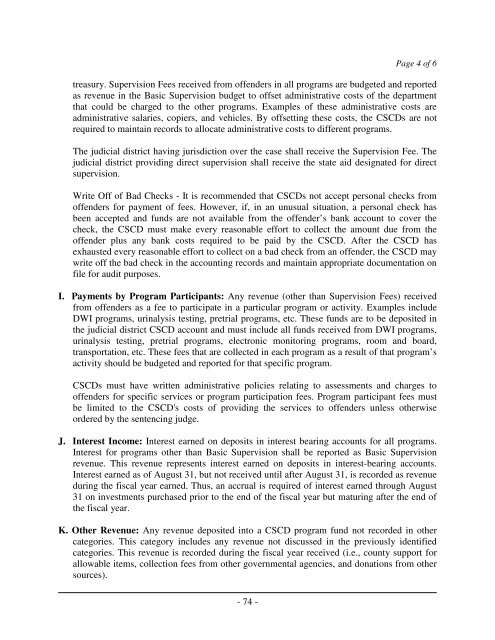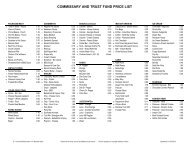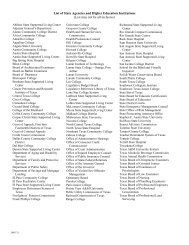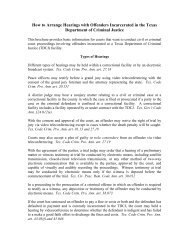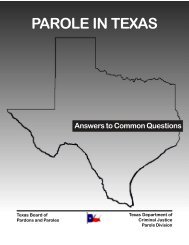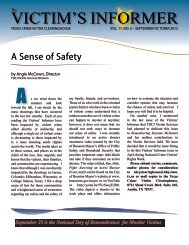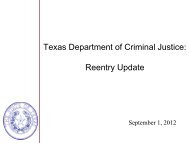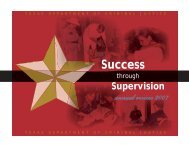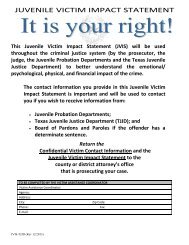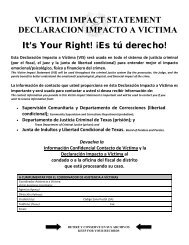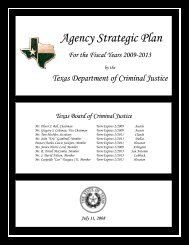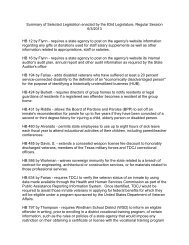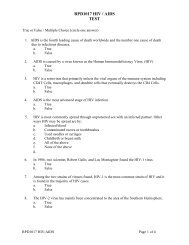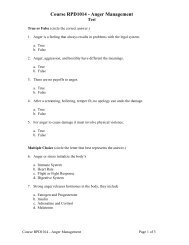TDCJ-CJAD Data Manual - Texas Department of Criminal Justice
TDCJ-CJAD Data Manual - Texas Department of Criminal Justice
TDCJ-CJAD Data Manual - Texas Department of Criminal Justice
You also want an ePaper? Increase the reach of your titles
YUMPU automatically turns print PDFs into web optimized ePapers that Google loves.
Page 4 <strong>of</strong> 6treasury. Supervision Fees received from <strong>of</strong>fenders in all programs are budgeted and reportedas revenue in the Basic Supervision budget to <strong>of</strong>fset administrative costs <strong>of</strong> the departmentthat could be charged to the other programs. Examples <strong>of</strong> these administrative costs areadministrative salaries, copiers, and vehicles. By <strong>of</strong>fsetting these costs, the CSCDs are notrequired to maintain records to allocate administrative costs to different programs.The judicial district having jurisdiction over the case shall receive the Supervision Fee. Thejudicial district providing direct supervision shall receive the state aid designated for directsupervision.Write Off <strong>of</strong> Bad Checks - It is recommended that CSCDs not accept personal checks from<strong>of</strong>fenders for payment <strong>of</strong> fees. However, if, in an unusual situation, a personal check hasbeen accepted and funds are not available from the <strong>of</strong>fender’s bank account to cover thecheck, the CSCD must make every reasonable effort to collect the amount due from the<strong>of</strong>fender plus any bank costs required to be paid by the CSCD. After the CSCD hasexhausted every reasonable effort to collect on a bad check from an <strong>of</strong>fender, the CSCD maywrite <strong>of</strong>f the bad check in the accounting records and maintain appropriate documentation onfile for audit purposes.I. Payments by Program Participants: Any revenue (other than Supervision Fees) receivedfrom <strong>of</strong>fenders as a fee to participate in a particular program or activity. Examples includeDWI programs, urinalysis testing, pretrial programs, etc. These funds are to be deposited inthe judicial district CSCD account and must include all funds received from DWI programs,urinalysis testing, pretrial programs, electronic monitoring programs, room and board,transportation, etc. These fees that are collected in each program as a result <strong>of</strong> that program’sactivity should be budgeted and reported for that specific program.CSCDs must have written administrative policies relating to assessments and charges to<strong>of</strong>fenders for specific services or program participation fees. Program participant fees mustbe limited to the CSCD's costs <strong>of</strong> providing the services to <strong>of</strong>fenders unless otherwiseordered by the sentencing judge.J. Interest Income: Interest earned on deposits in interest bearing accounts for all programs.Interest for programs other than Basic Supervision shall be reported as Basic Supervisionrevenue. This revenue represents interest earned on deposits in interest-bearing accounts.Interest earned as <strong>of</strong> August 31, but not received until after August 31, is recorded as revenueduring the fiscal year earned. Thus, an accrual is required <strong>of</strong> interest earned through August31 on investments purchased prior to the end <strong>of</strong> the fiscal year but maturing after the end <strong>of</strong>the fiscal year.K. Other Revenue: Any revenue deposited into a CSCD program fund not recorded in othercategories. This category includes any revenue not discussed in the previously identifiedcategories. This revenue is recorded during the fiscal year received (i.e., county support forallowable items, collection fees from other governmental agencies, and donations from othersources).- 74


